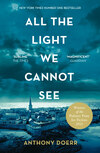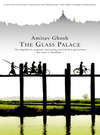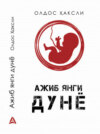Kitabı oku: «All the Light We Cannot See», sayfa 6
Good Evening. Or Heil Hitler if You Prefer.
His fourteenth birthday arrives in May. It’s 1940 and no one laughs at the Hitler Youth now. Frau Elena prepares a pudding and Jutta wraps a piece of quartz in newspaper and the twins, Hannah and Susanne Gerlitz, march around the room impersonating soldiers. A five-year-old—Rolf Hupfauer—sits in the corner of the sofa, eyelids slipping heavily over his eyes. A new arrival—a baby girl—sits in Jutta’s lap and gums her fingers. Out the window, beyond the curtains, the flame atop the waste stack, high in the distance, flaps and shivers.
The children sing and devour the pudding, Frau Elena says, “Time’s up,” and Werner switches off his receiver. Everyone prays. His whole body feels heavy as he carries the radio up to the dormer. In the alleys, fifteen-year-old boys are making their way toward mine elevators, queuing up with their helmets and lamps outside the gates. He tries to imagine their descent, sporadic and muted lights passing and receding, cables rattling, everyone quiet, sinking down to that permanent darkness where men claw at the earth with a half mile of rock hunched on top of them.
One more year. Then they’ll give him a helmet and lamp and stuff him into a cage with the others.
It has been months since he last heard the Frenchman on the shortwave. A year since he held that water-stained copy of The Principles of Mechanics. Not so long ago he let himself dream of Berlin and its great scientists: Fritz Haber, inventor of fertilizer; Hermann Staudinger, inventor of plastics. Hertz, who made the invisible visible. All the great men doing things out there. I believe in you, Frau Elena used to say. I think you’ll do something great. Now, in his nightmares, he walks the tunnels of the mines. The ceiling is smooth and black; slabs of it descend over him as he treads. The walls splinter; he stoops, crawls. Soon he cannot raise his head, move his arms. The ceiling weighs ten trillion tons; it gives off a permeating cold; it drives his nose into the floor. Just before he wakes, he feels a splintering at the back of his skull.
Rainwater purls from cloud to roof to eave. Werner presses his forehead to the window of the dormer and peers through the drops, the roof below just one among a cluster of wet rooftops, hemmed in by the vast walls of the cokery and smelter and gasworks, the winding tower silhouetted against the sky, mine and mill running on and on, acre after acre, beyond his range of sight, to the villages, the cities, the ever-quickening, ever-expanding machine that is Germany. And a million men ready to set down their lives for it.
Good evening, he thinks. Or heil Hitler. Everyone is choosing the latter.
Bye-bye, Blind Girl
The war drops its question mark. Memos are distributed. The collections must be protected. A small cadre of couriers has begun moving things to country estates. Locks and keys are in greater demand than ever. Marie-Laure’s father works until midnight, until one. Every crate must be padlocked, every transport manifest kept in a secure place. Armored trucks rumble at the loading docks. There are fossils to be safeguarded, ancient manuscripts; there are pearls, gold nuggets, a sapphire as big as a mouse. There might be, thinks Marie-Laure, the Sea of Flames.
From a certain angle, the spring seems so calm: warm, tender, each night redolent and composed. And yet everything radiates tension, as if the city has been built upon the skin of a balloon and someone is inflating it toward the breaking point.
Bees work the blooming aisles of the Jardin des Plantes. The plane trees drop their seeds and huge drifts of fluff gather on the walkways.
If they attack, why would they attack, they would be crazy to attack.
To retreat is to save lives.
Deliveries stop. Sandbags appear around the museum gates. A pair of soldiers on the roof of the Gallery of Paleontology peer over the gardens with binoculars. But the huge bowl of the sky remains untracked: no zeppelins, no bombers, no superhuman paratroopers, just the last songbirds returning from their winter homes, and the quicksilver winds of spring transmuting into the heavier, greener breezes of summer.
Rumor, light, air. That May seems more beautiful than any Marie-Laure can remember. On the morning of her twelfth birthday, there is no puzzle box in place of the sugar bowl when she wakes; her father is too busy. But there is a book: the second Braille volume of Twenty Thousand Leagues Under the Sea, as thick as a sofa cushion.
A thrill rides all the way into the nails of her fingers. “How—?”
“You’re welcome, Marie.”
The walls of their flat tremble with the dragging of furniture, the packing of trunks, the nailing shut of windows. They walk to the museum, and her father remarks distractedly to the warder who meets them at the door, “They say we are holding the river.”
Marie-Laure sits on the floor of the key pound and opens her book. When part one left off, Professor Aronnax had traveled only six thousand leagues. So many left to go. But something strange happens: the words do not connect. She reads, During the entire day, a formidable school of sharks followed the ship, but the logic that is supposed to link each word to the next fails her.
Someone says, “Has the director left?”
Someone else says, “Before the end of the week.”
Her father’s clothes smell of straw; his fingers reek of oil. Work, more work, then a few hours of exhausted sleep before returning to the museum at dawn. Trucks carry off skeletons and meteorites and octopi in jars and herbarium sheets and Egyptian gold and South African ivory and Permian fossils.
On the first of June, airplanes fly over the city, extremely high, crawling through the stratus clouds. When the wind is down and nobody is running an engine nearby, Marie-Laure can stand outside the Gallery of Zoology and hear them: a mile-high purr. The following day, the radio stations begin disappearing. The warders in the guards’ station whack the side of their wireless and tilt it this way and that, but only static comes out of its speaker. As if each relay antenna were a candle flame and a pair of fingers came along and pinched it out.
Those last nights in Paris, walking home with her father at midnight, the huge book clasped against her chest, Marie-Laure thinks she can sense a shiver beneath the air, in the pauses between the chirring of the insects, like the spider cracks of ice when too much weight is set upon it. As if all this time the city has been no more than a scale model built by her father and the shadow of a great hand has fallen over it.
Didn’t she presume she would live with her father in Paris for the rest of her life? That she would always sit with Dr. Geffard in the afternoons? That every year, on her birthday, her father would present her with another puzzle and another novel, and she would read all of Jules Verne and all of Dumas and maybe even Balzac and Proust? That her father would always hum as he fashioned little buildings in the evenings, and she would always know how many paces from the front door to the bakery (forty) and how many more to the brasserie (thirty-two), and there would always be sugar to spoon into her coffee when she woke?
Bonjour, bonjour.
Potatoes at six o’clock, Marie. Mushrooms at three.
Now? What will happen now?
Making Socks
Werner wakes past midnight to find eleven-year-old Jutta kneeling on the floor beside his cot. The shortwave is in her lap and a sheet of drawing paper is on the floor beside her, a many-windowed city of her imagination half-articulated on the page.
Jutta removes the earpiece and squints. In the twilight, her wild volutions of hair look more radiant than ever: a struck match.
“In Young Girls League,” she whispers, “they have us making socks. Why so many socks?”
“The Reich must need socks.”
“For what?”
“For feet, Jutta. For the soldiers. Let me sleep.” As though on cue, a young boy—Siegfried Fischer—cries out downstairs once, then twice more, and Werner and Jutta wait to hear Frau Elena’s feet on the stairs and her gentle ministrations and the house fall quiet once more.
“All you want to do are mathematics problems,” Jutta whispers. “Play with radios. Don’t you want to understand what’s happening?”
“What are you listening to?”
She crosses her arms and puts the earphone back and does not answer.
“Are you listening to something you’re not supposed to be listening to?”
“What do you care?”
“It’s dangerous, is why I care.”
She puts her finger in her other ear.
“The other girls don’t seem to mind,” he whispers. “Making socks. Collecting newspapers and all that.”
“We’re dropping bombs on Paris,” she says. Her voice is loud, and he resists an urge to clap his hand over her mouth.
Jutta stares up, defiant. She looks as if she is being raked by some invisible arctic wind. “That’s what I’m listening to, Werner. Our airplanes are bombing Paris.”
Flight
All across Paris, people pack china into cellars, sew pearls into hems, conceal gold rings inside book bindings. The museum workspaces are stripped of typewriters. The halls become packing yards, their floors strewn with straw and sawdust and twine.
At noon the locksmith is summoned to the director’s office. Marie-Laure sits cross-legged on the floor of the key pound and tries to read her novel. Captain Nemo is about to take Professor Aronnax and his companions on an underwater stroll through oyster beds to hunt for pearls, but Aronnax is afraid of the prospect of sharks, and though she longs to know what will happen, the sentences disintegrate across the page. Words devolve into letters, letters into unintelligible bumps. She feels as if big mitts have been drawn over each hand.
Down the hall, at the guards’ station, a warder twists the knobs of the wireless back and forth but finds only hiss and crackle. When he shuts it off, quiet closes over the museum.
Please let this be a puzzle, an elaborate game Papa has constructed, a riddle she must solve. The first door, a combination lock. The second, a dead bolt. The third will open if she whispers a magic word through its keyhole. Crawl through thirteen doors, and everything will return to normal.
Out in the city, church bells strike one. One thirty. Still her father does not return. At some point, several distinct thumps travel into the museum from the gardens or the streets beyond, as if someone is dropping sacks of cement mix out of the clouds. With each impact, the thousands of keys in their cabinets quiver on their pegs.
Nobody moves up or down the corridor. A second series of concussions arrives—closer, larger. The keys chime and the floor creaks and she thinks she can smell threads of dust cascading from the ceiling.
“Papa?”
Nothing. No warders, no janitors, no carpenters, no clop-clop-clop of a secretary’s heels crossing the hall.
They can march for days without eating. They impregnate every schoolgirl they meet.
“Hello?” How quickly her voice is swallowed, how empty the halls sound. It terrifies her.
A moment later, there are clanking keys and footfalls and her father’s voice calls her name. Everything happens quickly. He drags open big, low drawers; he jangles dozens of key rings.
“Papa, I heard—”
“Hurry.”
“My book—”
“Better to leave it. It’s too heavy.”
“Leave my book?”
He pulls her out the door and locks the key pound. Outside, waves of panic seem to be traveling the rows of trees like tremors from an earthquake.
Her father says, “Where is the watchman?”
Voices near the curb: soldiers.
Marie-Laure’s senses feel scrambled. Is that the rumble of airplanes? Is that the smell of smoke? Is someone speaking German?
She can hear her father exchange a few words with a stranger and hand over some keys. Then they are moving past the gate onto the rue Cuvier, brushing through what might be sandbags or silent police officers or something else newly planted in the middle of the sidewalk.
Six blocks, thirty-eight storm drains. She counts them all. Because of the sheets of wood veneer her father has tacked over its windows, their apartment is stuffy and hot. “This will just take a moment, Marie-Laure. Then I’ll explain.” Her father shoves things into what might be his canvas rucksack. Food, she thinks, trying to identify everything by its sound. Coffee. Cigarettes. Bread?
Something thumps again and the windowpanes tremble. Their dishes rattle in the cupboards. Automobile horns bleat. Marie-Laure goes to the model neighborhood and runs her fingers over the houses. Still there. Still there. Still there.
“Go to the toilet, Marie.”
“I don’t have to.”
“It may be a while until you can go again.”
He buttons her into her winter overcoat, though it is the middle of June, and they bustle downstairs. On the rue des Patriarches, she hears a distant stamping, as though thousands of people are on the move. She walks beside her father with her cane telescoped in one fist, her other hand on his rucksack, everything disconnected from logic, as in nightmares.
Right, left. Between turns run long stretches of paving stones. Soon they are walking streets, she is sure, that she has never been on, streets beyond the boundaries of her father’s model. Marie-Laure has long since lost count of her strides when they reach a crowd dense enough that she can feel heat spilling off of it.
“It will be cooler on the train, Marie. The director has arranged tickets for us.”
“Can we go in?”
“The gates are locked.”
The crowd gives off a nauseating tension.
“I’m scared, Papa.”
“Keep hold of me.”
He leads her in a new direction. They cross a seething thoroughfare, then go up an alley that smells like a muddy ditch. Always there is the muted rattling of her father’s tools inside his rucksack and the distant and incessant honking of automobile horns.
In a minute they find themselves amid another throng. Voices echo off a high wall; the smell of wet garments crowds her. Somewhere someone shouts names through a bullhorn.
“Where are we, Papa?”
“Gare Saint-Lazare.”
A baby cries. She smells urine.
“Are there Germans, Papa?”
“No, ma chérie.”
“But soon?”
“So they say.”
“What will we do when they get here?”
“We will be on a train by then.”
In the space to her right, a child screeches. A man with panic in his voice demands the crowd make way. A woman nearby moans, “Sebastien? Sebastien?” over and over.
“Is it night yet?”
“It’s only now getting dark. Let’s rest a moment. Save our breath.”
Someone says, “The Second Army mauled, the Ninth cut off. France’s best fleets wasted.”
Someone says, “We will be overrun.”
Trunks slide across tiles and a little dog yaps and a conductor’s whistle blows and some kind of big machinery coughs to a start and then dies. Marie-Laure tries to calm her stomach.
“But we have tickets, for God’s sake!” shouts someone behind her.
There is a scuffle. Hysteria ripples through the crowd.
“What does it look like, Papa?”
“What, Marie?”
“The station. The night.”
She hears the sparking of his lighter, the suck and flare of tobacco as his cigarette ignites.
“Let’s see. The whole city is dark. No streetlights, no lights in windows. There are projector lights moving through the sky now and then. Looking for airplanes. There’s a woman in a gown. And another carrying a stack of dishes.”
“And the armies?”
“There are no armies, Marie.”
His hand finds hers. Her fear settles slightly. Rain trickles through a downspout.
“What are we doing now, Papa?”
“Hoping for a train.”
“What is everybody else doing?”
“They’re hoping too.”
Herr Siedler
A knock after curfew. Werner and Jutta are doing schoolwork with a half-dozen other children at the long wooden table. Frau Elena pins her party insignia through her lapel before opening the door.
A lance corporal with a pistol on his belt and a swastika band on his left arm steps in from the rain. Beneath the low ceiling of the room, the man looks absurdly tall. Werner thinks of the shortwave radio tucked into the old wooden first-aid cabinet beneath his cot. He thinks: They know.
The lance corporal looks around the room—the coal stove, the hanging laundry, the undersize children—with equal measures of condescension and hostility. His handgun is black; it seems to draw all the light in the room toward it.
Werner risks a single glance at his sister. Her attention stays fixed on the visitor. The corporal picks up a book from the parlor table—a children’s book about a talking train—and turns every one of its pages before dropping it. Then he says something that Werner can’t hear.
Frau Elena folds her hands over her apron, and Werner can see she has done so to keep them from shaking. “Werner,” she calls in a slow, dreamlike voice, without taking her eyes from the corporal. “This man says he has a wireless in need of—”
“Bring your tools,” the man says.
On the way out, Werner looks back only once: Jutta’s forehead and palms are pressed against the glass of the living room window. She is backlit and too far away and he cannot read her expression. Then the rain obscures her.
Werner is half the corporal’s height and has to take two strides for every one of the man’s. He follows past company houses and the sentry at the bottom of the hill to where the mining officials reside. Rain falls slant through the lights. The few people they pass give the corporal a wide berth.
Werner risks no questions. With every heartbeat comes a sharp longing to run.
They approach the gate of the largest house in the colony, a house he has seen a thousand times but never so close. A large crimson flag, heavy with rainwater, hangs from the sill of an upstairs window.
The corporal raps on a rear door. A maid in a high-waisted dress takes their coats, expertly flips off the water, and hangs them on a brass-footed rack. The kitchen smells of cake.
The corporal steers Werner into a dining room where a narrow-faced woman with three fresh daisies stuck through her hair sits in a chair turning the pages of a magazine. “Two wet ducks,” she says, and looks back at her magazine. She does not ask them to sit.
A thick red carpet sucks at the soles of Werner’s brogues; electric bulbs burn in a chandelier above the table; roses twine across the wallpaper. A fire smolders in the fireplace. On all four walls hang framed tintypes of glowering ancestors. Is this where they arrest boys whose sisters listen to foreign radio stations? The woman turns pages of her magazine, one after another. Her fingernails are bright pink.
A man comes down the stairs wearing an extremely white shirt. “Christ, he is little, isn’t he?” he says to the lance corporal. “You’re the famous radio repairman?” The man’s thick black hair looks lacquered to his skull. “Rudolf Siedler,” he says. He dismisses the corporal with a slight wag of his chin.
Werner tries to exhale. Herr Siedler buttons his cuffs and examines himself in a smoky mirror. His eyes are profoundly blue. “Well. Not a long-winded boy, are you? There’s the offending device.” He points to a massive American Philco in the adjacent room. “Two fellows have looked at it already. Then we heard about you. Worth a try, right? She”—he nods at the woman—“is desperate to hear her program. News bulletins too, of course.”
He says this in such a way that Werner understands the woman does not really wish to listen to news bulletins. She does not look up. Herr Siedler smiles as if to say: You and I, son, we know history takes a longer course, don’t we? His teeth are very small. “Take your time with it.”
Werner squats in front of the set and tries to calm his nerves. He switches it on, waits for the tubes to warm, then runs the dial carefully down the band, right to left. He runs the knob back toward the right. Nothing.
It is the finest radio he has ever laid hands on: an inclined control panel, magnetic tuning, big as an icebox. Ten-tube, all-wave, superheterodyne, with fancy gadrooned moldings and a two-tone walnut cabinet. It has shortwave, wide frequencies, a big attenuator—this radio costs more than everything at Children’s House put together. Herr Siedler could probably hear Africa if he wanted to.
Green and red spines of books line the walls. The lance corporal is gone. In the next room, Herr Siedler stands in a pool of lamplight, talking into a black telephone.
They are not arresting him. They merely want him to fix this radio.
Werner unscrews the backing and peers inside. The tubes are all intact, and nothing looks amiss. “All right,” he mumbles to himself. “Think.” He sits cross-legged; he examines the circuitry. The man and the woman and the books and the rain recede until there is only the radio and its tangle of wires. He tries to envision the bouncing pathways of electrons, the signal chain like a path through a crowded city, RF signal coming in here, passing through a grid of amplifiers, then to variable condensers, then to transformer coils …
He sees it. There are two breaks in one of the resistance wires. Werner peers over the top of the set: to his left, the woman reads her magazine; to his right, Herr Siedler speaks into the telephone. Every so often Herr Siedler runs his thumb and finger along the crease in his pin-striped trousers, sharpening it.
Could two men have missed something so simple? It feels like a gift. So easy! Werner rewinds the resistance track and splices the wires and plugs in the radio. When he turns it on, he half expects fire to leap out of the machine. Instead: the smoky murmur of a saxophone.
At the table the woman puts down her magazine and sets all ten fingers on her cheeks. Werner climbs out from behind the radio. For a moment his mind is clear of all feeling save triumph.
“He fixed it just by thinking!” the woman exclaims. Herr Siedler covers the mouthpiece of the telephone receiver and looks over. “He sat there like a little mouse and thought, and in half a minute it was fixed!” She flourishes her brilliant fingernails and breaks into childlike laughter.
Herr Siedler hangs up the phone. The woman crosses into the sitting room and kneels in front of the radio—she is barefoot, and her smooth white calves show beneath the hem of her skirt. She rotates the knob. There is a sputter, then a torrent of bright music. The radio produces a vivid, full sound: Werner has never heard another like it.
“Oh!” Again she laughs.
Werner gathers his tools. Herr Siedler stands in front of the radio and seems about to pat him on the head. “Outstanding,” he says. He ushers Werner to the dining table and calls for the maid to bring cake. Immediately it appears: four wedges on a plain white plate. Each is dusted with confectioners’ sugar and topped by a dollop of whipped cream. Werner gapes. Herr Siedler laughs. “Cream is forbidden. I know. But”—he puts a forefinger to his lips—“there are ways around such things. Go on.”
Werner takes a piece. Powdered sugar cascades down his chin. In the other room the woman twists the dial, and voices sermonize from the speaker. She listens awhile, then applauds, kneeling there in her bare feet. The stern faces in the tintypes stare down.
Werner eats one piece of cake, then another, then takes a third. Herr Siedler watches with his head slightly cocked, amused, considering something. “You do have a look, don’t you? And that hair. Like you’ve had a terrible shock. Who is your father?”
Werner shakes his head.
“Right. Children’s House. Silly me. Have another. Get some more cream on it, now.”
The woman claps again. Werner’s stomach gives a creaking sound. He can feel the man’s eyes on him.
“People say it must not be a great posting, here at the mines,” says Herr Siedler. “They say: ‘Wouldn’t you rather be in Berlin? Or France? Wouldn’t you rather be a captain at the front, watching the lines advance, away from all this’”—he waves his hand at the window—“‘soot?’ But I tell them I live at the center of it all. I tell them this is where the fuel is coming from, the steel too. This is the furnace of the country.”
Werner clears his throat. “We act in the interest of peace.” It is, verbatim, a sentence he and Jutta heard on Deutschlandsender radio three days before. “In the interest of the world.”
Herr Siedler laughs. Again Werner is impressed with how numerous and tiny his teeth are.
“You know the greatest lesson of history? It’s that history is whatever the victors say it is. That’s the lesson. Whoever wins, that’s who decides the history. We act in our own self-interest. Of course we do. Name me a person or a nation who does not. The trick is figuring out where your interests are.”
A single slice of cake remains. The radio purrs and the woman laughs and Herr Siedler looks almost nothing, Werner decides, like his neighbors, their guarded, anxious faces—faces of people accustomed to watching loved ones disappear every morning into pits. His face is clean and committed; he is a man supremely confident in his privileges. And five yards away kneels this woman with varnished fingernails and hairless calves—a woman so entirely removed from Werner’s previous experience that it is as if she is from a different planet. As if she has stepped out of the big Philco itself.
“Good with tools,” Herr Siedler is saying. “Smart beyond your years. There are places for a boy like you. General Heissmeyer’s schools. Best of the best. Teach the mechanical sciences too. Code breaking, rocket propulsion, all the latest.”
Werner does not know where to set his gaze. “We do not have money.”
“That’s the genius of these institutions. They want the working classes, laborers. Boys who aren’t stamped by”—Herr Siedler frowns—“middle-class garbage. The cinemas and so forth. They want industrious boys. Exceptional boys.”
“Yes, sir.”
“Exceptional,” he repeats, nodding, talking as if only to himself. He gives a whistle and the lance corporal returns, helmet in hand. The soldier’s eyes flit to the remaining piece of cake and then away. “There’s a recruiting board in Essen,” Herr Siedler is saying. “I’ll write you a letter. And take this.” He hands Werner seventy-five marks, and Werner tucks the bills into his pocket as quickly as he can.
The corporal laughs. “Looks like it burned his fingers!”
Herr Siedler’s attention is somewhere else. “I will send Heissmeyer a letter,” he repeats. “Good for us, good for you. We act in the interest of the world, eh?” He winks. Then the corporal gives Werner a curfew pass and shows him out.
Werner walks home oblivious to the rain, trying to absorb the immensity of what has happened. Nine herons stand like flowers in the canal beside the coking plant. A barge sounds its outcast horn and coal cars trundle to and fro and the regular thudding of the hauling machine reverberates through the gloom.
At Children’s House, everyone has been put to bed. Frau Elena sits just inside the entryway with a mountain of laundered stockings in her lap and the bottle of kitchen sherry between her feet. Behind her, at the table, Jutta watches Werner with electric intensity.
Frau Elena says, “What did he want?”
“He only wanted me to fix a radio.”
“Nothing more?”
“No.”
“Did they have questions? About you? Or the children?”
“No, Frau Elena.”
Frau Elena lets out a huge breath, as if she has not exhaled these past two hours. “Dieu merci.” She rubs her temples with both hands. “You can go to bed now, Jutta,” she says.
Jutta hesitates.
“I fixed it,” says Werner.
“That’s a good boy, Werner.” Frau Elena takes a long pull of sherry and her eyes close and her head rocks back. “We saved you some supper.” Jutta walks to the stairs, uncertainty in her eyes.
In the kitchen, everything looks coal-stained and cramped. Frau Elena brings a plate; on it sits a single boiled potato cut in two.
“Thank you,” says Werner. The taste of the cake is still in his mouth. The pendulum swings on and on in the old grandfather clock. The cake, the whipped cream, the thick carpet, the pink fingernails and long calves of Frau Siedler—these sensations whirl through Werner’s head as if on a carousel. He remembers towing Jutta to Pit Nine, where their father disappeared, evening after evening, as if their father might come shuffling out of the elevators.
Light, electricity, ether. Space, time, mass. Heinrich Hertz’s Principles of Mechanics. Heissmeyer’s famous schools. Code breaking, rocket propulsion, all the latest.
Open your eyes, the Frenchman on the radio used to say, and see what you can with them before they close forever.
“Werner?”
“Yes, Frau?”
“Aren’t you hungry?”
Frau Elena: as close to a mother as he will ever have. Werner eats, though he is not hungry. Then he gives her the seventy-five marks, and she blinks at the amount and gives fifty back.
Upstairs, after he has heard Frau Elena go to the toilet and climb into her own bed and the house has become utterly quiet, Werner counts to one hundred. Then he rises from his cot and takes the little shortwave radio out of the first-aid box—six years old and bristling with his modifications, replacement wires, a new solenoid, Jutta’s notations orbiting the tuning coil—and carries it into the alley behind the house and crushes it with a brick.










